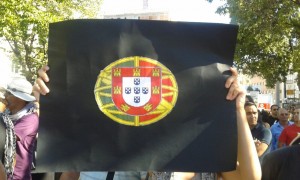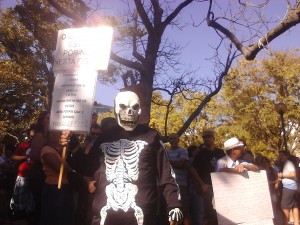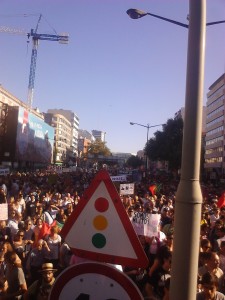
It was a demonstration born on Facebook, on Saturday, September 8 – 24 hours after Portuguese Prime Minister Pedro Passos Coelho announced a new tax on all workers. Exactly a week later it was reality – never since the revolution of 1974 had so many taken the streets to express their anger at the government.
More than 1.5 million people hit the streets, according to state news agency LUSA. The hub of the protest was Lisbon, where 350,000 people walked two miles from Praça Jose Fontana Square to Praça de Espanha Square.
In Porto, the same: more than 100,000 came out to Praça da Liberdade for more than four hours, to show their anger at the conditions resulting from the country’s bailout package from the IMF, the EU and the ECB.
At 6.30pm, in Aveiro, the demographically youngest city in Portugal, a 30-year-old man set fire to himself and then jumped into City Hall. He survived, after being helped by the police and some demonstrators. He has been out of work for more than three years.

The Portuguese government is a coalition between two parties: the PSD Social Democratic Party, which leans to the right and which who won the last elections; and the CDS, a former Christian-democratic party, now a neo-con populist group. Last week Passos Coelho, of the PSD, announced he would increase the Social Security tax for workers, while decreasing the same tax for employers, in order to ensure the country meets the fiscal targets of its bailout package. Coelho assured that the CDS knew about the new plan, but CDS leader and Foreign Minister Paulo Portas said that wasn’t the case.

The new Social Security plan guarantees savings of more than €1 billion for big companies, while cutting a full monthly salary for all employees over the year. The main opposition Socialist Party responded by announcing it will vote against the 2013 state budget. Amid all the political chaos, President Aníbal Cavaco Silva called for a meeting of the State Council, the most important group of Portuguese sovereign institutions, which will take place on September 21.
Saturday’s protest is only the first in a series that will continue on September 29, when the major Portuguese union, CGTP, will hold a “fight day” against the government and its policies.
Leave a Reply
You must be logged in to post a comment.